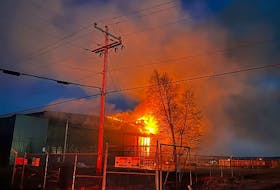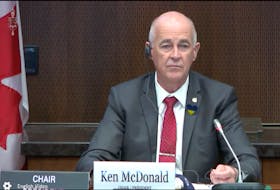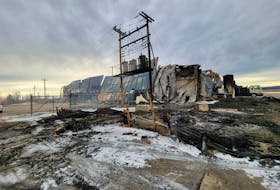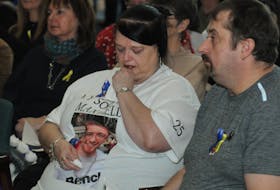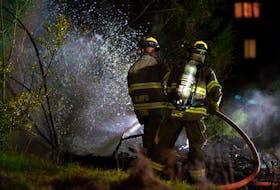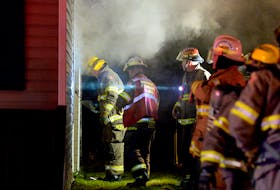ST. JOHN'S, N.L. — The civil liberties of Canadians are not a luxury to be lost in the fog of emergency management during a crisis, an independent rights watchdog has said in a report released Friday, giving this province a failing grade when it comes to maintaining civil liberties with its travel ban.
“The Come From Away province told Canadians who’d come from away to bloody well stay away,” wrote Michael Bryant, executive director and general counsel for the Canadian Civil Liberties Association (CCLA), in a report examining the impact of actions taken by individual provinces and territories as well as the country as a whole during what it calls the first wave of COVID-19.
It’s not that fundamental rights can never be restricted, the association wrote, but restrictions must be required by law to be necessary, proportionate and time-limited.
The CCLA examined the impact on civil liberties of COVID-19-related measures taken in various areas and ways, from those affecting children and other vulnerable people in hospitals, long-term care homes, prisons, shelters, and immigration detention centres, and in violent domestic situations, to the actions taken by governments when it comes to modifying public behaviour. The COVID-19 pandemic has resulted in the most serious restrictions on Canadians' rights since the 1970 October Crisis, the association concluded, saying marginalized people are bearing the worst of it.
Alberta’s contact tracing app received a C grade. Nunavut’s physical distancing laws improved from a D to a B+ after the government responded to feedback and made changes to the rules. The quarantine procedure at Canadian Forces Base Trenton — where Canadian residents who had returned via chartered government planes from Wuhan, China, and the Diamond Princess cruise ship were quarantined for two weeks in a four-star hotel with access to lawyers if they wished — earned a B+. The federal government’s closure of the international border received a C+.
Three specific pieces of legislation earned an F from the CCLA, which explained that grade was reserved for “a power grab that is wildly disproportionate — or completely unconnected to — the situation it is meant to address.” They included Alberta’s Bill 10, which changed that province’s Public Health Act to allow a single cabinet minister to change or replace laws without approval from the legislature; Ontario’s first-responder bill, which allows specific first responders access to COVID-19 status information about people with whom they are coming in contact; and Newfoundland and Labrador’s travel ban.
The travel ban, implemented by the provincial government as a special measure under the Public Health Act, bans anyone from entering the province apart from permanent residents, asymptomatic workers and those who have been granted special exemptions in advance.
The ban has resulted in two lawsuits: one filed by the CCLA and Halifax resident Kim Taylor, a Kilbride native who was denied permission to enter this province to attend her mother’s funeral, but was granted entry 11 days later; and a pending class-action suit by Canadians with properties in Newfoundland and Labrador who are banned from gaining access to them.
“The Newfoundland government has failed to justify the necessity of a border closure that does not offer a self-isolation plan or other forms of adherence to public health orders as conditions for entry,” the CCLA report states, noting when the ban was implemented the province had not seen a new COVID-19 case in more than two weeks. “It seems clear that the mandatory 14-day isolation period had been effective at controlling the virus. That the travel ban was unnecessary is made even clearer from the fact that many workers and other individuals had been travelling between Newfoundland on one hand and Quebec and Alberta in the weeks prior to the travel ban, yet no new cases had emerged.”
No clear benefit from the ban has been proven, the CCLA said, though it has caused damage to people like Taylor, who were subject to what the association called an “arbitrary government decision-making process.”
The ban would have gotten a better grade if it had included exemptions for people in situations like Taylor’s.
“Instead she was left to the mercy of a government decision-maker who did not provide any indication that their denial of her application was based on any objective standards,” the CCLA wrote.
When contacted by The Telegram for comment, a spokeswoman for the province’s Department of Justice and Public Safety said measures ordered by the chief medical officer of health have been implemented to protect public health.
“Government will continue working co-operatively with the (chief medical officer of health) to take the necessary steps to protect public health,” the spokeswoman said. “The Public Health Protection and Promotion Act requires the chief medical officer of health to impose no greater restriction than is reasonably required to respond to the public health emergency."
In court, lawyers for Taylor and the CCLA asked the province to show them the science behind the travel ban that leads it to believe it is required. In its report, the CCLA suggested chief medical officers, who “are neither lawyers nor versed in socioeconomic affairs, public education or industry,” should seek input from others, including human rights commissioners, chief privacy officers, deputy attorney generals and auditors general.
Friday afternoon the province announced its second day of no active COVID-19 cases and is preparing to move down to the more relaxed Alert Level 2 next week, allowing bars, gyms, playgrounds and other businesses to open. Officials are reportedly considering joining an “Atlantic bubble,” allowing people to travel between the Atlantic provinces without a 14-day mandatory period of self-isolation.
@tara_bradbury



